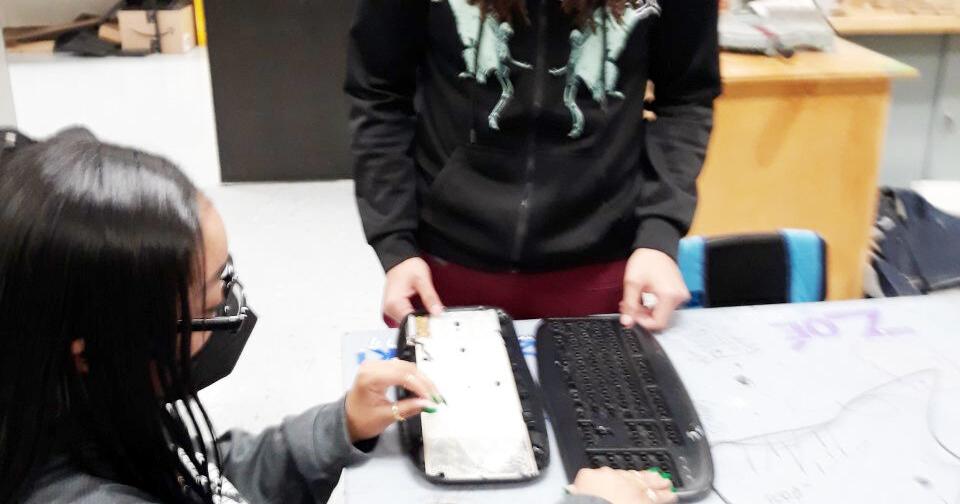MONESSEN – The Business and Bots class at Monessen High School is providing students with experience in developing a business acumen, while at the same time learning the spirit of competition or generating empathy for their fellow man.
Matthew Strine teaches the class and came up with its name, since students are running a business to ensure ample funding for the robotics part of the class. Strine said he was able to secure $21,000 in grant money to purchase necessary items.
“The easiest way to teach business is to have a business,” Strine said. “So, we run a business out of my classroom. They’re learning all about business by running this business.”
What that business has included is making items, such as key chains or T-shirts, with the paw logo of the school’s mascot, the greyhound.
“We print them and we sell them to the students, and that’s one revenue stream to be able to fund things like bots,” Strine said.
This provides the students with other business experience, such as establishing reasonable prices for the merchandise while being able to realize a profit.
Senior Aidan Bittinger has been very involved in making the products.
“It’s a very free class,” he said. “It teaches you a lot about entrepreneurship. I want to build a business for clothes and stuff like that.”
While all of the students in the class are involved in the business portion, the rest either partake in BotsIQ or Project Invent.
BotsIQ students have the opportunity to take part in the Southwestern Pennsylvania BotsIQ, a battle bot competition. This year’s preliminary competition is scheduled for March at Westmoreland County Community College.
Students build the robots to get them ready for the competition in which they fight other robots.
The class faced some battery issues last year, so their robot wasn’t able to compete. Steps have been taken to make sure that doesn’t happen this year. Plus, there are two separate groups each working on their own bot.
“Last year we showed up. We didn’t compete,” Strine said about his plan of progression for BotsIQ. “This year we’re going to show up and compete. Next year, we’re going to show up and actually win a match and in year four, my plan is, we’re going to win a trophy.”
Project Invent just started this year at Monessen. The group has a community partner and works with that partner to identify their needs and how they can then address a need through invention. Strine saw it as a way of teaching empathy and robotics skills at the same time.
There are two Project Invent teams.
One team has partnered with a former Monessen student who now must use a wheelchair for mobility and is living with a brain disease.
The group is looking to make a conversion kit that could basically motorize any push wheelchair without the expense of buying an electric one.
“(The students) are trying to take a regular push wheelchair and mechanize it,” Strine explained. “They’re trying to build a convertibility kit where you can take the wheels off and put motors on. You hook (the motors) up to a robotics processor and with your hands you can press buttons that will make the wheels go.”
The other group is partnering with a current Monessen student who recently became legally blind. The student has told the team members she isn’t looking to learn Braille, as this is a fairly new disability for her.
The students are working to create a keyboard overlay that will have touch features for key recognition, and then audio as well to ensure she is typing the correct letters each time.
“They’re trying to make a keyboard overlay, a plastic sheet that would fit over all of the keys that when she presses (keys), it’s going to literally read to her (those keys) as she types,” Strine said. “They’re going to 3-D print the overlay, so the letters are raised up and she’s able to feel what she’s pressing.”
Junior Kyla Lugo explained that the group is working on something similar to a flash drive for the project.
“It will work into the coding so when you press a letter, it will sound out that letter for those who cannot see the letter,” Lugo said. “I enjoy it, because I know that I’m helping someone.”
Freshman Rick Hazuka said another key step will be adjusting the speaker to just the right volume.
“I feel it’s really going to help people who are blind apply for work and are trying to fill out paperwork on computers,” he said. “They can’t see to type, so they’ll be able to hear their typing.”
Junior Jailynn Crews said the group got to meet the student for whom they are making the keyboard overlay.
“It was informational,” Crews said. “She was very vocal about her struggles. She let us know she liked our ideas.”
Crews said she has enjoyed the freedom for creativity the class has provided.
“We’re allowed to venture out and try what we think will work,” she said. “I appreciate that.”
Students will get to pitch their inventions in April at an event called Demo Day. They will create a video and be questioned on their invention. There will be 10 virtual presentations made that night in four regions across the country.
“Of the 10 presentations, four groups are going to win an award,” Strine said. “Four of the 10 groups will win $500 that night. Forty groups across the country will go on in the competition. From that, they pick eight groups to bring to San Jose, Calif., to actually do a live pitch with actual investors. They could potentially be awarded a couple thousand dollars if they made it that far.”
Credit: Source link



